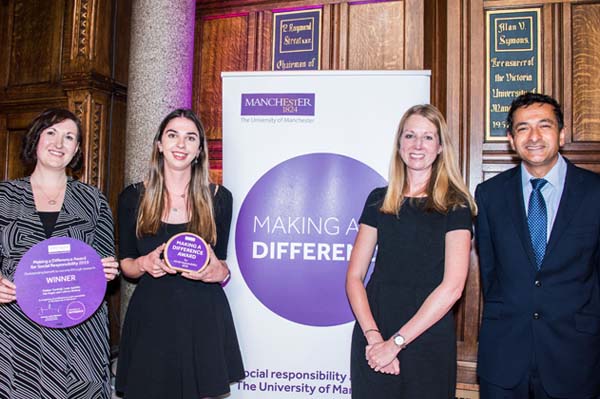
Suicide prevention in action
On average there is one death by suicide every two hours in the UK. It is the leading cause of death among young people aged 20 to 34 and the highest suicide rates occur in men aged between 40 and 44 years old.
For more than 20 years one research group at The University of Manchester has been playing its part in trying to reduce rates of suicides in the UK.
The National Confidential Inquiry in to Suicide and Safety in Mental Health (NCISH) has been researching deaths related to mental health issues since 1996.
“Our general remit is to collect information on every single person who has died by suicide and was in contact with mental health services in the year before they died,” Pauline Turnbull, NCISH Project Director, explained.
“What we’ve done over the years is to come up with a number of different recommendations based on the characteristics of the people who had mental health service contact and the care that they received.”
“It’s really important to make practical and clinical recommendations that can have an impact on suicide rates but also improve safety for everybody.”

Dr Pauline Turnbull
Pauline is Project Director for the National Confidential Inquiry into Suicide and Safety in Mental Health.
Recommendations with impact
As Pauline states, the aim of their work is to try and have an impact on wider society and to help prevent unavoidable deaths. They do this by making a number of key recommendations to health services who care for mental health patients.
Ultimately, services aren’t obliged to take these suggestions on board, though many of the recommendations have made it into policy across the UK.
As a result, NCISH have been investigating the impact of their recommendations.
“We conducted a survey with all mental health services across the UK to find out whether they had implemented our recommendations, how many they had implemented, and then a before or after study to assess the impact.”
“We found that services who implemented more of our recommendations had a significant reduction in their suicide rates.”
“We also found that there was a reduction in suicide rates in services who had implemented specific recommendations around, for example, post discharge periods and crisis services.”
“Services that implemented more of our recommendations had a significant reduction in their suicide rates.”
A career started in Manchester
Pauline herself has always harboured ambitions to work within the mental health sector and the beginning of that road started here at the University.
“I did an undergraduate degree in Psychology at Manchester and remember doing my dissertation on self-harm and the influence of the media,” Pauline said.
“After graduating I was lucky enough to start working for NCISH as a Research Assistant before moving on to do my PhD. Things then came a full circle when I got the job as a Project Manager for NCISH a few years ago.”
In her current role as Project Director, Pauline now works with NCISH’s senior clinical academics to look at ways to expand their work, particularly in the context of a national target of reducing suicide rates in the UK by 10% by 2021.

The road ahead
Historically, the team has investigated suicides by people who had contact with mental health services in the year leading up to their death to identify opportunities for intervention and improving safety. They are now also beginning to look at those who die by suicide without being in contact with services.
“Around a third of people who die by suicide have had contact with mental health services in the year before they died and we are often asked ‘what about those people who haven’t been in contact with mental health services’,” Pauline said.
“Our work is expanding more to look at people who have died by suicide within the community. We run topic studies which allow us to look at something in detail that is a particular concern or priority within suicide prevention.”
“We obtain information about general population suicide deaths and recently we published a study about children and young people who died by suicide without necessarily being in contact with any services. We’re now expanding this general population work to look at men who died by suicide in mid-life.”
“Since 2018 we have been working directly with local areas under a government-funded initiative to implement our recommendations through local suicide prevention plans. This marks an exciting new opportunity for us to bring our research evidence directly to local agencies for change.”
Although it’s impossible to predict what will be achieved in the future, their current work is cause for celebration; suicide rates have dipped in services that have taken on board their recommendations and this has resulted in their work being recognised by the University of Manchester’s Making a Difference Awards.
Making a difference
After being nominated in the Outstanding Benefit to Society Through Research category, the team comprised of Pauline Turnbull, Louis Appleby, Nav Kapur and Cathryn Rodway discovered on Thursday 2 May 2019 that they had won.
Pauline said: “We are delighted that our suicide prevention work has been recognised by this award, particularly as the University has such a strong emphasis on social responsibility.”
“We look forward to our continuing collaboration with the NHS and other agencies to embed recommendations from our data into local practice for the benefit of patients and the public.”
Find out more about the National Confidential Inquiry into Suicide and Mental Health and their recommendations.

